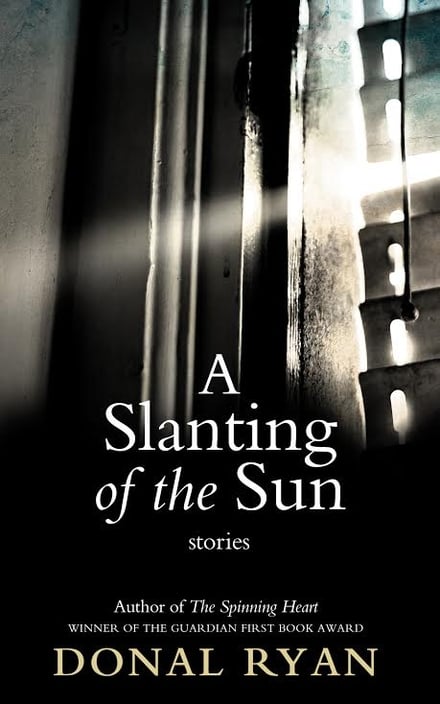Donal Ryan’s first book of short stories, A Slanting of The Sun was the difficult third book for the author of The Spinning Heart, and became so challenging that he contemplated ending his publishing deal, he tells Paddy Kehoe.
When I produce the tape recorder, Donal Ryan is reminded of the movie The Sixth Sense. “You know at the end where he checks all his old tapes, and he hears the voices, freaky. See it, no? “I haven’t seen The Sixth Sense as it happens, maybe the last man on the planet not to have seen it. “Ah man, it’s terrifying, one of the really subtly scary films,” he says.
Which prompts me to say that he is somewhat into scaring readers himself in his dark stories of dysfunction, terror and violence. “Well, not really, actually, “ the quiet-spoken Nenagh man quickly replies, while just as quickly agreeing that there is an element. “Absolutely, yeah.” He pauses – “ . . kind of unconscious I think, y’know. I suppose it’s not healthy really to have an interest in sadness, but I mean it’s just something I think about a lot, people in situations where it just permeates their lives.”
The kind of anxiety that many of his characters have to live with has always been there. “Even mindfulness isn’t modern,” Donal observes. “I had a grand-uncle who died at 108, Jack Ryan from Hollyfort, and he practised mindfulness all his life, in so many words. He lived in the moment, he never dwelt in the past. All you have is the moment really.” And how is he himself in terms of that philosophy? “Ah sure, yeah, I need to be told all the time,” he replies, bemused.
Some of the stories were written while he was writing the novels, The Spinning Heart and The Thing About December. Writing those early stories was a respite from the heavy lifting of the novel. However, when he needed to focus exclusively on the stories to complete the three book-deal, they became more difficult to write.
It was more of a chore then? “Christ, worse than a chore. I was giving up, I was saying to my wife Anne Marie, I can’t do this at all. It got so hard at one stage I was saying to her I’m actually going to quit, I’m going to tell Doubleday (publishers) that the deal is off. “ But everything came right in the end, and his most honest critic is Anne Marie. When he sees that warm glow of approval on his wife's features, Donal knows that the material has passed muster, and indeed the stories are marvellously engaging.
The story Retirement Do was written while he was writing a novel so it was one of the ones that didn't need much effort. “Maybe because it’s a little bit fantastical and it’s a little outside of things that I would normally write about,” he muses. His scenarios, dark as they are, are not quite as bare-facedly ‘out there’ as the serial killer who finally decides to give up, hence the Retirement Do of the title.

The scenarios he usually posits are not as extraordinary as the scenario in Retirement Do, but they have within them nevertheless the potential for unusually acute pain and trauma. In the powerful opening story, The Passion, a young man crashes a car and a young woman dies, a kind of dynastic fury is unleashed, but an unexpected bond develops between the young driver and the girl’s mother. In The Squad, another young man - there are a lot of ‘young men’ - rapes a woman and is shot dead in a revenge act.
Ryan can be lyrical and tender too as in the brilliant story Aisling, which concerns a short summer fling between a young barman and an ambitious young girl who leaves for college. “She gave me the road not long after,” says the rejected youth. Ryan’s prose runs on a healthy sprinkling of such vernacular ruralisms, clearly part of his charm for Irish readers.
“These triumphs are really fleeting, “ he says when I bring up the Guardian First Book award - which he won - and his long-listing for the Man Booker prize, amongst various other nominations and awards. “There’s an awful lot of luck involved and things fall your way. It’s great on the night and it’s great to get recognition but there is always guilt attached to winning anything, the guilt about being a winner over other writers.”
He says his confidence as a writer ebbs and flows wildly. “Every second day I’d be thinking I’m the worst writer in the world, every writer in the world is more intelligent and skilled.” Doubt melts away when he is writing. He enjoys the process and can get stuck in typically for about three hours at a stretch, but he can spend anything up to seven or eight hours writing, “and I just feel joy while it’s happening.”
These days he is writer-in-residence at the University of Limerick. “Saved my bacon actually, because I was really floundering at home and I’d quit the day job.” The day job was Labour Inspector for the National Employment Rights Authority. He and Anne Marie live near Limerick city and they have two children, Thomas, who is seven and five-year-old Lucy.
The affable, companionable writer recalls that when he did not make the Booker shortlist for The Spinning Heart a newspaper carried the headline: `Donal Ryan fails to be shortlisted.’ "But I didn’t attempt to do anything, so I couldn’t have failed,” he notes and it is hard to disagree with that assessment.
That guilt about less favoured writers which he mentioned earlier was presumably sorted when he didn’t find himself on the Man Booker shortlist? “Yea, I felt better then,“ he laughs, aware of the irony of it all.
A Slanting of the Sun is published in paperback by Doubleday Ireland.

